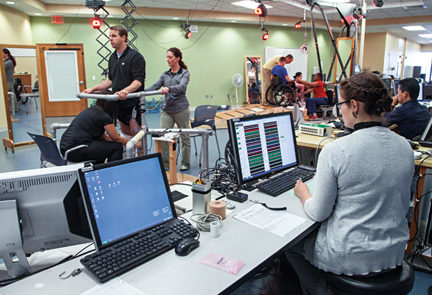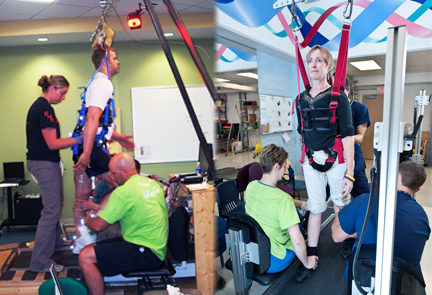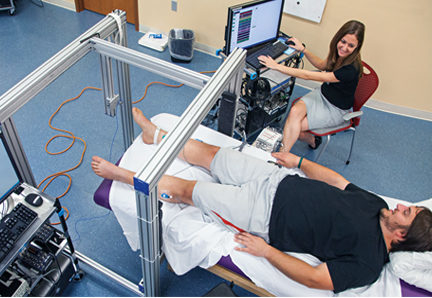Medical Breakthrough Helping Paralyzed Patients Move Again?
 |
University of Louisville Assistant Professor Dr. Claudia Angeli and spinal cord study participant Rob Summers on the medical breakthrough that is raising hope for those facing paralysis.
|
Paralysed Men Move Again With Spinal Stimulation
 |
Four paralysed men have been able to move their legs for the first time in years after electrical stimulation of their spinal cords, US doctors report. They were able to flex their toes, ankles and knees – but could not walk independently. A report, in the journal Brain, suggests the electricity makes the spinal cord more receptive to the few messages still arriving from the brain. Experts said it could become a treatment for spinal injury. The spinal cord acts like a high-speed rail line carrying electrical messages from the brain to the rest of the body. But if there is any damage to the track, then the message will not get through. People with spinal cord injuries can lose all movement and sensation below the injury.
|
‘Shocking’ Study Gives Hope to Paralyzed People; Shows Electricity Helps Them Stand, Move Legs
 |
Electricity may provide hope to men and women who suffer paralysis. Three years ago, doctors reported that zapping a paralyzed man’s spinal cord with electricity allowed him to stand and move his legs. Now they’ve done the same with three other patients, suggesting their original success was no fluke. “This is wonderful news. Spinal cord injury need no longer be a lifelong sentence of paralysis,” said Dr. Roderic Pettigrew, director of the National Institute of Biomedical Imaging and Bioengineering, one of the National Institutes of Health, according to NBC News. “It is just downright marvelous.”
|
Paralyzed Men Move Their Legs Again With Breakthrough Spinal Treatment
 |
Researchers at the University of Louisville had only intended to study nerve pathways, but they made a far more surprising discovery. By applying electrical stimulation to the spinal cord through the use of an implant, patients with chronic complete paralysis were able to move. After the initial findings with patient Rob Summers, three other paralyzed men were tested and able to move their legs, wiggle their toes.
|
Electrical Pulses Help Paralyzed Patients Move
 |
Four people who were paralyzed below the waist for more than two years were able to voluntarily wiggle their toes and flex their legs, thanks to a promising study that some are heralding as a breakthrough in spinal-cord-injury treatment. The key to the achievement, say the study’s authors, was stimulation of the spinal cord using a commercially available electrical stimulator commonly used to treat pain. The device is surgically implanted just above the spine’s dura, in the epidura, where animal studies showed it could appropriately relay signals to the legs and lower extremities.
|
Zapping spinal cord with electricity helps paralyzed men move legs again
 |
LONDON – Four paralyzed patients have regained some ability to flex their toes, ankles and knees after receiving a novel type of electrical stimulation therapy known as epidural stimulation, according to a new study supported by the National Institutes of Health (NIH).“The result of this study has been really exciting news for these four patients, which is that spinal cord injury may no longer mean a lifelong sentence of complete paralysis,” Dr. Roderic Pettigrew, director of the National Institute of Biomedical Imaging and Bioengineering (NIBIB) at NIH.
|
Institute of Electrical and Electronics Engineers, Spectrum Magazine
 |
Dustin Shillcox fully embraced the vast landscape of his native Wyoming. He loved snowmobiling, waterskiing, and riding four-wheelers near his hometown of Green River. But on 26 August, 2010, when he was 26 years old, that active lifestyle was ripped away.
|
Standing Promise
 |
Electrode implants have already helped one paralysis patient get on his feet again. Is walking the next step?
|
4 Lessons From a Breakthrough Spinal Stimulation Treatment
 |
Four years after an auto accident left him paralyzed from the chest down, Rob Summers was standing on his own two feet. Here’s how his doctors did it.
|
Rob Summers: From Quad to Para and Beyond?
 |
It almost looks easy — just apply 10 volts of electric current to the spinal cord and — voila! — a paralyzed man stands.
|
|
Epidural Stimulation Program
Epidural Stimulation Timeline
Motor Control
Cardiovascular and Respiratory
Bladder, Bowel and Sexual Function
Publications – Epidural Stimulation |














